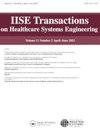Modeling of the collections process in the blood supply chain: A literature review
IF 1.5
Q3 HEALTH CARE SCIENCES & SERVICES
IISE Transactions on Healthcare Systems Engineering
Pub Date : 2020-07-02
DOI:10.1080/24725579.2020.1776426
引用次数: 14
Abstract
Abstract Human blood is a scarce resource and its role in healthcare is fundamental, with donated blood saving the lives of many on a daily basis. The blood supply chain is responsible for the transfer of blood from donor to the recipient, but the availability of such an invaluable resource as human blood is ultimately attributable to the many voluntary donors. Thus, the efficiency of the collection of donated blood is crucial to the downstream effectiveness of the blood supply chain. We provide a detailed review on the use of quantitative methods for the process of blood collection from donors. We describe the functional areas which are appointment scheduling, collection policy, crisis situation, donor demographics, location/clinic planning, staff utilization and vehicle routing. Furthermore, we analyze the existing literature with regards to methods, modeling objectives and the planning levels such as strategic, tactical and operational. Finally, we break down the articles into whether or not case studies lead to the implementation of the methods in practice. In total, we review 46 relevant publications on the intersection between OR/MS and other disciplines. We use our presented framework to categorize the existing approaches and highlight gaps such as scheduling of both staff and appointments for blood donation clinics.血液供应链中采集过程的建模:文献综述
摘要人类血液是一种稀缺资源,其在医疗保健中的作用至关重要,捐献的血液每天都在挽救许多人的生命。血液供应链负责将血液从捐献者转移到接受者,但人类血液这样宝贵的资源的可用性最终要归功于许多自愿捐献者。因此,采集捐献血液的效率对血液供应链的下游有效性至关重要。我们提供了一份关于定量方法在献血者血液采集过程中的使用的详细综述。我们描述了功能领域,包括预约安排、收集政策、危机情况、捐赠者人口统计、地点/诊所规划、员工利用率和车辆路线。此外,我们还分析了有关方法、建模目标和规划级别(如战略、战术和作战)的现有文献。最后,我们将文章分解为案例研究是否能在实践中实现这些方法。我们总共回顾了46篇关于OR/MS与其他学科交叉的相关出版物。我们使用我们提出的框架对现有方法进行分类,并强调差距,如献血诊所的工作人员和预约安排。
本文章由计算机程序翻译,如有差异,请以英文原文为准。
求助全文
约1分钟内获得全文
求助全文
来源期刊

IISE Transactions on Healthcare Systems Engineering
Social Sciences-Safety Research
CiteScore
3.10
自引率
0.00%
发文量
19
期刊介绍:
IISE Transactions on Healthcare Systems Engineering aims to foster the healthcare systems community by publishing high quality papers that have a strong methodological focus and direct applicability to healthcare systems. Published quarterly, the journal supports research that explores: · Healthcare Operations Management · Medical Decision Making · Socio-Technical Systems Analysis related to healthcare · Quality Engineering · Healthcare Informatics · Healthcare Policy We are looking forward to accepting submissions that document the development and use of industrial and systems engineering tools and techniques including: · Healthcare operations research · Healthcare statistics · Healthcare information systems · Healthcare work measurement · Human factors/ergonomics applied to healthcare systems Research that explores the integration of these tools and techniques with those from other engineering and medical disciplines are also featured. We encourage the submission of clinical notes, or practice notes, to show the impact of contributions that will be published. We also encourage authors to collect an impact statement from their clinical partners to show the impact of research in the clinical practices.
 求助内容:
求助内容: 应助结果提醒方式:
应助结果提醒方式:


